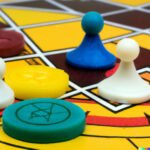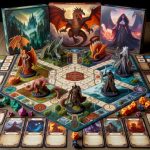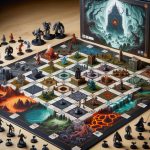Dungeons and Dragons board game strategy is an essential component of the popular role-playing game, requiring players to carefully plan their moves and make strategic decisions in order to navigate through the fantasy world. Understanding the intricacies of the game and developing a winning strategy can be challenging, but with the right approach, players can master the art of Dungeons and Dragons gameplay.
The Dungeons and Dragons board game offers a unique blend of fantasy, adventure, and strategy, allowing players to immerse themselves in a richly detailed world filled with monsters, treasures, and magic. Whether you are new to the game or an experienced player looking to improve your skills, this article will guide you through the basics of Dungeons and Dragons gameplay and provide valuable insights into crafting a winning strategy.
In this section, we will explore the fundamental aspects of Dungeons and Dragons board game strategy, from understanding the basics of the game to choosing the right character for your strategy. By delving into these key elements, you will gain a solid foundation that will enable you to build advanced strategies and tactics as you continue to develop your expertise in the game.
So grab your character sheet, roll some dice, and let’s embark on this epic journey into mastering the art of Dungeons and Dragons board game strategy.
Understanding the Basics of Dungeons and Dragons Board Game
Dungeons and Dragons (D&D) is a fantasy tabletop role-playing game that has been captivating players for decades. In the Dungeons and Dragons board game, players can enter a world of adventure, battling monsters, casting spells, and solving puzzles as they navigate various campaigns and scenarios. Understanding the basics of the game is crucial for success, so here are some key concepts to keep in mind:
- Character Creation: One of the fundamental aspects of D&D is creating your character. Players must choose their race, class, abilities, and skills carefully to complement their play style and contribute effectively to the team.
- Combat Mechanics: Combat in D&D involves rolling dice to determine hits, misses, damage dealt, and various other outcomes. Familiarizing yourself with the combat mechanics is essential for making strategic decisions during battles.
- Campaign Settings: Each campaign in D&D takes place in a unique fantasy world with its own lore, geography, and inhabitants. Understanding the setting of the campaign can help players make informed decisions and immerse themselves fully in the game.
To excel in your Dungeons and Dragons board game strategy, it’s imperative to grasp these basics before diving into more advanced tactics. With a solid understanding of character creation, combat mechanics, and campaign settings, players can set themselves up for success as they embark on their epic adventures.
Players who are new to tabletop role-playing games may find it helpful to familiarize themselves with D&D’s unique rules and gameplay mechanics before delving deeper into strategy development. Additionally, seeking guidance from experienced players or studying resources such as rulebooks and online forums can provide valuable insights into creating an effective strategy for conquering dungeons and defeating dragons.
Ultimately, mastering the basics of Dungeons & Dragons board game lays a strong foundation for developing successful strategies that will lead to thrilling gameplay experiences and memorable victories. By honing your understanding of character creation options, combat mechanics intricacies or campaign settings details you will be ready to undertake any adventure ahead with confidence.
Choosing the Right Character for Your Strategy
When playing the Dungeons and Dragons board game, one of the most important decisions you will make is choosing the right character for your strategy. Your character choice will greatly impact your gameplay and the success of your team. Here are some factors to consider when selecting your character:
Understanding the Character Classes
There are several different character classes in Dungeons and Dragons, each with its own strengths, weaknesses, and abilities. Before choosing a character, take some time to familiarize yourself with the different classes such as warriors, wizards, rogues, and clerics. Consider how each class can complement the overall strategy of your team.
Assessing Your Playstyle
Your playstyle should also influence your character choice. If you enjoy playing up-close combat and taking on enemies head-on, a warrior or barbarian might be the best fit for you. On the other hand, if you prefer casting spells from a distance and supporting your team with magic, then a wizard or sorcerer could be more suitable.
Considering Team Composition
It’s essential to consider the team composition when choosing your character. Think about what roles are already filled by other players and how you can add value to the team. For example, if no one has chosen a healer, you may want to consider playing as a cleric to ensure that your team has adequate support during battles.
By carefully considering these factors and conducting thorough research into each character class’s attributes, abilities, and playstyles beforehand can help ensure that you choose a character that aligns with your personal preferences while also contributing to an effective overall strategy in Dungeons and Dragons board game play.
Tips for Building an Effective Team
Building an effective team in the Dungeons and Dragons board game is crucial for success. Here are some tips for creating a well-rounded group of characters to enhance your gameplay:
- Consider the party’s composition: When building a team, it’s important to consider the roles that each character will play. A well-balanced party typically includes a mixture of damage dealers, healers, and support characters.
- Communication is key: It’s essential for players to communicate and coordinate their actions effectively. This means discussing each character’s strengths and weaknesses, as well as strategizing how best to work together as a team.
- Diversify abilities: To ensure versatility in tackling various challenges within the game, it’s wise to have characters with diverse abilities. This can include combat skills, magic spells, and other special abilities that complement each other.
By following these tips, you can build a team that works well together and maximizes your chances of success in the Dungeons and Dragons board game.
As you choose your team members, keep in mind that each player should bring something unique to the table. This diversity will allow the group to overcome different obstacles and challenges they may encounter during their adventure.
In addition to individual strengths, it’s also important to consider how characters’ abilities complement each other. Whether it’s through healing spells or offensive maneuvers, having a well-coordinated team will greatly improve your chances of victory in any quest or battle within the game.
The Importance of Understanding the Rulebook
One of the key elements in developing a successful Dungeons and Dragons board game strategy is understanding the rulebook. Familiarizing yourself with the rules and mechanics of the game will give you an advantage when it comes to making strategic decisions during gameplay. The rulebook provides valuable information on character abilities, combat tactics, and overall gameplay mechanics that can greatly impact your strategy.
In addition, understanding the rulebook can also help you anticipate your opponents’ moves and develop counter-strategies. By knowing the rules inside and out, you can gain insights into potential actions that your opponents may take, allowing you to adapt your strategy accordingly. This level of preparedness can give you a significant edge in the game and increase your chances of success.
Furthermore, mastering the rulebook can open up new possibilities for creative and unique strategies. By fully understanding the boundaries and limitations set by the game’s rules, you can explore unconventional tactics that may catch your opponents off guard. This allows for a more dynamic and engaging gaming experience, as players are encouraged to think outside the box when devising their strategies.
| Element | Importance |
|---|---|
| Familiarity with rules | Key for making strategic decisions |
| Anticipating opponents’ moves | Allows for adapting strategy accordingly |
| Creative strategies | Opens up new possibilities for unique tactics |
Crafting a Winning Dungeons and Dragons Board Game Strategy
When it comes to crafting a winning strategy for the Dungeons and Dragons board game, it’s important to consider a few key elements. First and foremost, understanding your character’s strengths and weaknesses is crucial.
Each character in the game has their own unique abilities and skills, so it’s important to choose a character that complements your overall strategy. Whether you prefer to play as a wizard, rogue, fighter, or cleric – each class brings its own set of advantages to the table.
In addition to choosing the right character, building an effective team is essential for success in the game. A well-balanced team that includes characters with diverse skill sets can greatly enhance your chances of victory.
For example, having a mix of characters who excel in combat, magic, healing, and support can help cover all bases when facing various challenges within the game. Coordinating with your teammates and making sure everyone understands their roles is paramount in creating a winning strategy.
Lastly, understanding the rulebook is essential for crafting a winning Dungeons and Dragons board game strategy. Knowing the rules inside and out will give you an edge over your opponents. This includes understanding movement rules, combat mechanics, spellcasting guidelines, and more.
By fully grasping the rules of the game, you can devise more effective tactics and approaches to different scenarios. With these key elements in mind – choosing the right character, building an effective team, and understanding the rulebook – you’ll be well on your way to mastering a winning dungeons and dragons board game strategy.
Common Mistakes to Avoid in Dungeons and Dragons Board Game Strategy
When playing a complex and strategic game like Dungeons and Dragons board game, it’s essential to avoid certain mistakes that could hinder your chances of winning. Many players make common errors that can be easily avoided with the right knowledge and preparation. Understanding these pitfalls is crucial for crafting a successful strategy and improving your gameplay.
One common mistake to avoid in Dungeons and Dragons board game strategy is neglecting the importance of teamwork. The game is designed to be played as a collaborative effort, so it’s crucial to work together with your fellow players to achieve victory. Avoid being overly focused on individual achievements and instead prioritize cooperation and communication with your team members.
Another mistake to steer clear of is underestimating the rulebook. Some players may try to rely on their memory or intuition when it comes to the rules, but this can lead to misunderstandings and disputes during gameplay. Take the time to thoroughly understand the rulebook and refer back to it whenever necessary. This will ensure that everyone is on the same page and prevent any unnecessary conflicts during the game.
It’s also important not to rush through decision-making in the heat of battle. Taking the time to carefully consider your options and discuss strategies with your team can lead to better outcomes. Patience and thoughtful planning are key components of a successful Dungeons and Dragons board game strategy.
| Mistakes | How to Avoid |
|---|---|
| Neglecting teamwork | Prioritize collaboration with team members |
| Underestimating the rulebook | Thoroughly understand and refer back to the rulebook when needed |
| Rushing decision-making | Take time for careful consideration and discussion with team |
Advanced Strategies for Experienced Players
Mastering Your Role
For experienced Dungeons and Dragons board game players, mastering your chosen role is essential for success. Whether you prefer to play as a powerful spellcaster, a swift rogue, or a resilient tank, understanding the intricacies of your character’s abilities and how they interact with the rest of the team is crucial. Take the time to thoroughly explore your character’s strengths and weaknesses and learn how to leverage them effectively in different situations.
Adapting to Dynamic Challenges
Experienced players know that no two Dungeons and Dragons board game sessions are alike. As such, it’s important to be adaptable in your strategy. This means being able to quickly assess new challenges as they arise and adjust your approach accordingly. Whether it’s facing off against a formidable foe or solving a complex puzzle, being able to think on your feet and come up with creative solutions is key to mastering advanced strategies in the game.
Utilizing Team Synergy
While individual mastery is important, experienced players understand that true success in Dungeons and Dragons board game often comes from effective teamwork. Advanced strategies involve not only knowing how to optimize your own character’s abilities but also how to work cohesively with others in the party.
This means synergizing spells and abilities, communicating effectively, and supporting each other in combat and decision-making. Recognizing the strengths of each team member and finding ways to amplify them can significantly increase your chances of victory.
As an experienced player of Dungeons and Dragons board game strategy, these advanced strategies will elevate your gameplay to new heights. By mastering your role, adapting to dynamic challenges, and utilizing team synergy, you can become an unstoppable force within the game world. So go forth with confidence, knowing that you have the knowledge and skills needed to conquer any adventure that comes your way.
Conclusion
In conclusion, mastering the art of Dungeons and Dragons board game strategy is a challenging yet rewarding endeavor. By understanding the basics of the game, choosing the right character for your strategy, and building an effective team, players can greatly improve their chances of success. It is also important to thoroughly understand the rulebook in order to make informed decisions during gameplay.
Crafting a winning Dungeons and Dragons board game strategy requires careful planning, teamwork, and adaptability. Players must be aware of common mistakes to avoid, such as neglecting communication within the team or underestimating the importance of resource management. By learning from these mistakes, players can refine their strategies and become more formidable opponents.
For experienced players looking to take their skills to the next level, there are advanced strategies that can be employed. These may include mastering complex character abilities, incorporating intricate tactics into gameplay, and honing decision-making skills. With dedication and practice, players can continually improve their performance in the Dungeons and Dragons board game, making each match a thrilling and fulfilling experience.
Frequently Asked Questions
Is There Strategy in DnD?
There is definitely a strategy in DnD. Players need to make tactical decisions, think strategically, and work together to overcome challenges. From character creation to combat encounters, strategy is essential.
What Is the Best Way to Learn Dungeons and Dragons?
The best way to learn Dungeons and Dragons is by finding a group of experienced players who can teach you the ropes. Alternatively, there are plenty of online resources, rulebooks, and tutorials available for beginners.
Which Dungeons and Dragons Board Game Should I Start With?
If you’re new to Dungeons and Dragons board games, “Castle Ravenloft” or “Wrath of Ashardalon” are great starting points. Both games offer engaging gameplay, cooperative elements, and a taste of the DnD universe without being too overwhelming for beginners.

I love playing all kinds of games – from classics like Monopoly to modern favourites like Ticket to Ride.
I created this blog as a way to share my love of board games with others, and provide information on the latest releases and news in the industry.





